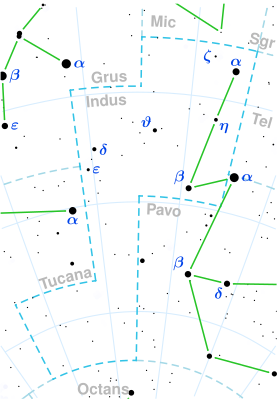Theta Indi
| Observation data Epoch J2000 Equinox J2000 | |
|---|---|
| Constellation | Indus |
| Right ascension | 21h 19m 51.98955s[1] |
| Declination | −53° 26′ 57.9315″[1] |
| Apparent magnitude (V) | 4.40[2] |
| Characteristics | |
| Spectral type | A5IV-V[3] |
| B−V color index | +0.18[2] |
| Astrometry | |
| Radial velocity (Rv) | −14.50[4] km/s |
| Proper motion (μ) | RA: +107.90[1] mas/yr Dec.: −66.41[1] mas/yr |
| Parallax (π) | 33.02 ± 0.49 mas[1] |
| Distance | 99 ± 1 ly (30.3 ± 0.4 pc) |
| Absolute magnitude (MV) | 1.98[5] |
| Details | |
| Mass | 1.75[6] M☉ |
| Radius | 1.61[7] R☉ |
| Luminosity | 12.95[8] L☉ |
| Temperature | 8,332[6] K |
| Rotational velocity (v sin i) | 135[7] km/s |
| Age | 150±100[7] Myr |
| Other designations | |
| Database references | |
| SIMBAD | data |
Theta Indi (θ Ind) is a binary star in the constellation Indus. Its apparent magnitude is 4.40[2] and it is approximately 98.8 light years away based on parallax.[1] The smaller companion, B, has a spectral type of G0V (yellow main-sequence) and an apparent magnitude of 7.18 at a separation of 6.71″.[9] Recent observations suggest the primary is itself a binary with components Aa and Ab orbiting at 0.0617″, estimated period about 1.3 years.[10][11]
References
- ^ a b c d e f van Leeuwen, F. (2007). "Validation of the new Hipparcos reduction". Astronomy and Astrophysics. 474 (2): 653–664. arXiv:0708.1752. Bibcode:2007A&A...474..653V. doi:10.1051/0004-6361:20078357. S2CID 18759600. Vizier catalog entry
- ^ a b c d "Theta Indi". SIMBAD Astronomical Database. Retrieved 2016-08-23.
- ^ Gray, R. O.; Garrison, R. F. (July 1989), "The late A-type stars - Refined MK classification, confrontation with Stromgren photometry, and the effects of rotation", Astrophysical Journal Supplement Series, 70 (4): 623–636, Bibcode:1989ApJS...70..623G, doi:10.1086/191349
- ^ Wilson, R. E. (1953), "General Catalogue of Stellar Radial Velocities", Carnegie Institute Washington D.C. Publication, Carnegie Institution of Washington, Bibcode:1953GCRV..C......0W, LCCN 54001336
- ^ Anderson, E.; Francis, Ch. (May 2012). "XHIP: An extended hipparcos compilation". Astronomy Letters. 38 (5): 331–346. arXiv:1108.4971. Bibcode:2012AstL...38..331A. doi:10.1134/S1063773712050015. S2CID 119257644. Vizier catalog entry
- ^ a b David, Trevor J.; Hillenbrand, Lynne A. (May 2015). "The Ages of Early-type Stars: Strömgren Photometric Methods Calibrated, Validated, Tested, and Applied to Hosts and Prospective Hosts of Directly Imaged Exoplanets". The Astrophysical Journal. 804 (2): 146–184. arXiv:1501.03154. Bibcode:2015ApJ...804..146D. doi:10.1088/0004-637X/804/2/146. S2CID 33401607. Vizier catalog entry
- ^ a b c Plavchan, Peter; et al. (June 2009), "New Debris Disks Around Young, Low-Mass Stars Discovered with the Spitzer Space Telescope", The Astrophysical Journal, 698 (2): 1068–1094, arXiv:0904.0819, Bibcode:2009ApJ...698.1068P, doi:10.1088/0004-637X/698/2/1068, S2CID 51417657.
- ^ McDonald, I.; Zijlstra, A. A.; Boyer, M. L. (2012). "Fundamental parameters and infrared excesses of Hipparcos stars". Monthly Notices of the Royal Astronomical Society. 427 (1): 343–357. arXiv:1208.2037. Bibcode:2012MNRAS.427..343M. doi:10.1111/j.1365-2966.2012.21873.x. S2CID 118665352. Vizier catalog entry
- ^ Eggleton, P. P.; Tokovinin, A. A. (September 2008), "A catalogue of multiplicity among bright stellar systems", Monthly Notices of the Royal Astronomical Society, 389 (2): 869–879, arXiv:0806.2878, Bibcode:2008MNRAS.389..869E, doi:10.1111/j.1365-2966.2008.13596.x, S2CID 14878976 Vizier catalog entry
- ^ Mason, Brian D.; et al. (December 2001), "The 2001 US Naval Observatory Double Star CD-ROM. I. The Washington Double Star Catalog", The Astronomical Journal, 122 (6): 3466–3471, Bibcode:2001AJ....122.3466M, doi:10.1086/323920 Vizier catalog entry
- ^ Marion, L.; Absil, O.; Ertel, S.; Le Bouquin, J.-B.; Defrère, D. (July 2014), Rajagopal, Jayadev K; Creech-Eakman, Michelle J; Malbet, Fabien (eds.), "Unveiling new stellar companions from the PIONIER exozodi survey", Proceedings of the SPIE, Optical and Infrared Interferometry IV, 9146: 91461K, arXiv:1410.5714, Bibcode:2014SPIE.9146E..1KM, doi:10.1117/12.2057823, S2CID 54045048

